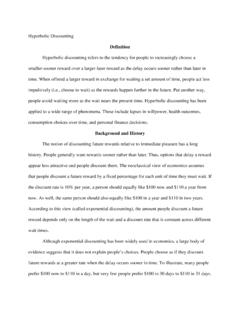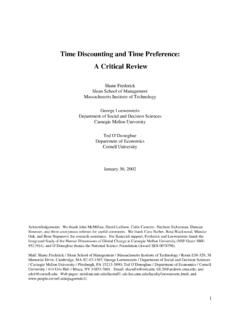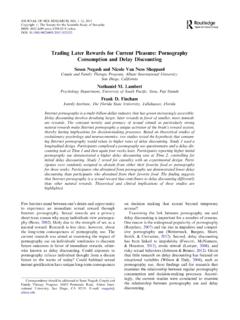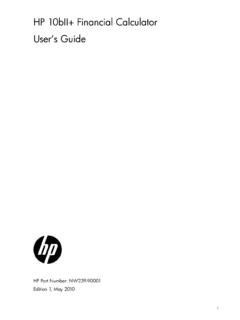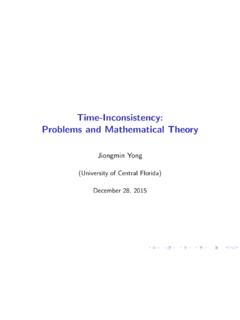Transcription of THE PREVENTION OF LIFESTYLE-RELATED CHRONIC …
1 DELSA/HEA/WD/HWP(2008)2 OECD HEALTH WORKING PAPERS THE PREVENTION OF LIFESTYLE-RELATED CHRONIC DISEASES: AN ECONOMIC FRAMEWORK Franco Sassi and Jeremy Hurst 32 Unclassified DELSA/HEA/WD/HWP(2008)2 Organisation de Coop ration et de D veloppement ..conomiques Organisation for Economic Co-operation and Development 25-Mar-2008 _____English - Or. English DIRECTORATE FOR EMPLOYMENT, LABOUR AND SOCIAL AFFAIRS HEALTH COMMITTEE Health Working Papers OECD HEALTH WORKING PAPER NO.
2 32 The PREVENTION of LIFESTYLE-RELATED CHRONIC Diseases: an Economic Framework Franco Sassi and Jeremy Hurst JEL Classification: H23, H51, I12, I18 JT03242851 Document complet disponible sur OLIS dans son format d'origine Complete document available on OLIS in its original format DELSA/HEA/WD/HWP(2008)2 Unclassified English - Or. English DELSA/HEA/WD/HWP(2008)2 2 DIRECTORATE FOR EMPLOYMENT, LABOUR AND SOCIAL AFFAIRS OECD HEALTH WORKING PAPERS This series is designed to make available to a wider readership health studies prepared for use within the OECD. Authorship is usually collective, but principal writers are named.
3 The papers are generally available only in their original language English or French with a summary in the other. Comment on the series is welcome, and should be sent to the Directorate for Employment, Labour and Social Affairs, 2, rue Andr -Pascal, 75775 PARIS CEDEX 16, France. The opinions expressed and arguments employed here are the responsibility of the author(s) and do not necessarily reflect those of the OECD Applications for permission to reproduce or translate all or part of this material should be made to: Head of Publications Service OECD 2, rue Andr -Pascal 75775 Paris, CEDEX 16 France Copyright OECD 2008 DELSA/HEA/WD/HWP(2008)
4 2 3 ACKNOWLEDGEMENTS The authors would like to thank Donald Kenkel, Marc Suhrcke, Evi Hatziandreu and Edward Glaeser for comments on the ideas developed in this paper, and on an early draft presented at an Expert Group meeting held in Paris in April 2007. The authors would also like to thank all the experts who participated in that meeting on behalf of OECD member countries, as well as Loek Boonekamp, Linda Fulponi and Koji Miyamoto, for their valuable inputs.
5 Finally, they are grateful to Peter Scherer, Elizabeth Docteur, John Martin and Martine Durand for comments provided on various drafts, and Gabrielle Luthy and Christine Charlemagne for editorial assistance. The authors remain responsible for any errors and omissions. The Economics of PREVENTION project is partly funded through regular contributions from OECD member countries. Additional voluntary contributions to the project were made by the following member countries: Australia, Denmark, Mexico, Netherlands, Sweden and Switzerland. The project is also partly supported by a grant from the Directorate General for Public Health and Consumer Affairs of the European Commission.
6 The contents of this paper do not necessarily reflect the views of the Commission. DELSA/HEA/WD/HWP(2008)2 4 ABSTRACT This paper provides an economic perspective on the PREVENTION of CHRONIC diseases, focusing in particular on diseases linked to lifestyle choices. The proposed economic framework is centred on the hypothesis that the PREVENTION of CHRONIC diseases may provide the means for increasing social welfare, enhancing health equity, or both, relative to a situation in which CHRONIC diseases are simply treated once they emerge.
7 Testing this hypothesis requires the completion of several conceptual and methodological steps. The pathways through which CHRONIC diseases are generated must be identified as well as the levers that could modify those pathways. Justification for action must be sought by examining whether the determinants of CHRONIC diseases are simply the outcome of efficient market dynamics, or the effect of market and rationality failures preventing individuals from achieving the best possible outcomes. Where failures exist, possible preventive interventions must be conceived, whose expected impact on individual choices should be commensurate to the extent of those failures and to the severity of the outcomes arising from them.
8 A positive impact of such interventions on social welfare and health equity should be assessed empirically through a comprehensive evaluation before interventions are implemented. JEL Classification: H23, H51, I12, I18. Keywords: health determinants; non-communicable diseases; PREVENTION ; market failure; rationality; choice; cost-benefit analysis; cost-effectiveness analysis; health equity. DELSA/HEA/WD/HWP(2008)2 5 Le pr sent rapport appr hende dans une optique conomique la question de la pr vention des maladies chroniques, en mettant tout particuli rement l accent sur celles qui sont associ es au mode de vie.
9 Le cadre conomique propos repose essentiellement sur l hypoth se selon laquelle la pr vention des maladies chroniques peut permettre d am liorer le bien- tre social ou d accro tre l quit face la sant , ou les deux, par rapport une situation dans laquelle ces maladies sont simplement trait es lorsqu elles se d clarent. Pour v rifier cette hypoth se, il faut accomplir plusieurs t ches d ordre conceptuel et m thodologique. Il est n cessaire de cerner le processus qui aboutit l apparition des maladies chroniques, ainsi que les moyens susceptibles d infl chir ce processus.
10 Pour d finir l action mener dans ce sens, il faut examiner si les d terminants de ces maladies sont simplement issus de la dynamique d un march efficient ou s ils d coulent d une d faillance du march et d un d faut de rationalit qui emp chent les individus d obtenir les meilleurs r sultats possibles. Lorsqu il y a d faillance, il est n cessaire de d finir les mesures pr ventives qui pourraient tre prises, mesures dont l impact attendu sur les choix individuels doit tre proportionnel l ampleur de cette d faillance et la gravit des effets qu elle produit. Il conviendrait d examiner si ces mesures auront une incidence positive sur le bien- tre social et l quit face la sant en effectuant une valuation approfondie l aide de donn es concr tes avant leur application.










